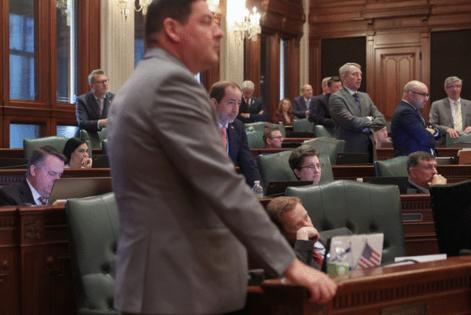Illinois House passes bill allowing terminally ill people to end their lives with physician's help
Published in News & Features
SPRINGFIELD, Ill. — Legislation that would allow terminally ill people to end their lives with the help of a doctor was narrowly passed by the Illinois House and now heads to the Senate.
It marks the first time a medical aid in dying bill has passed through one legislative chamber in Illinois since advocates unsuccessfully pushed for the practice to be legalized in the state last year.
The bill passed late Thursday by a 63-42 vote, just three votes more than the minimum number required for bills to pass the House by a simple majority, with a handful of Democrats joining Republicans in voting against it.
The measure would legalize medical aid in dying, sometimes referred to as physician-assisted suicide or medically-assisted death, allowing mentally competent, terminally ill adults the right to access life-ending prescription medication.
“I think that the one of the most frightening things about death for most of us is that it means the ultimate loss of control,” Rep. Kelly Cassidy, a Chicago Democrat who voted for the bill, said during the House debate. “Death, like life, is easier to navigate when you know you will have options to choose from, even if you never need to or even if you choose not to.”
If a bill is passed by the Senate and signed by Gov. JB Pritzker, Illinois would join 10 other states, among them Oregon, California, Colorado and Hawaii, as well as Washington, D.C., in allowing medical aid in dying.
The legislation received support from the American Civil Liberties Union of Illinois and Compassion and Choices Action Network. Opponents, including disability rights activists and the Catholic church, say it could lead to discrimination, coercion and abuse. Some medical practitioners also opposed the measure.
Under the bill, an attending physician “must provide sufficient information to a patient about all appropriate end-of-life care options,” including comfort care, hospice care, palliative care, and pain control, as well as the foreseeable risks and benefits of each.
The eligible patient “may orally request a prescription for medication” under the measure from their attending physician and it must be documented. The patient must also request the medication in writing to their attending physician after making the oral request, but the patient must also make a second oral request five days after the initial one.
The written request for the medication must also be witnessed by two people “who attest that to the best of their knowledge” that the patient is acting voluntarily and is mentally sound, the bill says. The bill also lists various limitations as to who can act as witnesses.
“At the time the patient makes the second oral request, the attending physician shall offer the patient an opportunity to rescind the request,” the legislation says. “Oral and written requests for aid in dying may be made only by the patient and shall not be made by the patient’s surrogate decision-maker, health care proxy, health care agent, attorney-in-fact for health care, guardian, nor via advance health care directive.”
While Democrats and Republicans largely differed on the merits of the legislation, some shared personal experiences to explain their position in dealing with the death of a loved one.
Democratic state Rep. Nicolle Grasse, who has a background as a hospice chaplain, said she’s walked with “literally thousands of people through the final days of their lives and being at their bedside,” and believes the medical aid in dying legislation would allow people to have appropriate control of their mortality if they’re suffering.
“I know some people worry about where this could lead. And please know I understand those concerns and I hear those,” said Grasse, of Arlington Heights. “But I ask all of us here to consider this: Not one of us can control whether or not we will die. Every single one of us will die. But we can offer people the comfort of controlling what matters most to them and to us as they are dying.”
Rep. Anthony DeLuca, a Chicago Heights Democrat, called this an issue of “faith and science colliding.” As he discussed how his sister unexpectedly took her own life, he asked that the bill not be referred to as “assisted suicide.”
“This bill is not suicide,” he said before voting in favor of the bill.
House Republican leader Tony McCombie talked about taking care of her mother as she suffered from throat cancer before she died, and why she felt the legislation was not the answer in such situations.
“We had conversations when I was feeding her through her feeding tube that we never would have had if this would have been the law because she wouldn’t have done it for her pain, she would have done it for mine,” said McCombie, of Savanna. “I know this is a very emotional issue, but this is not the bill, this is not the way that this needs to go.”
During floor debate, Republicans also said the legislation would transform a doctor’s role as a healer into someone who kills their patients.
“Every moment of life should be cherished, and this bill’s sole purpose is to extinguish it,” said GOP state Rep. Tom Weber of Lake Villa. “At the same time, we are turning those who have spent their careers saving life into life takers. I find it sad that Illinois wants to be the destination to end life.”
“We’ve already recognized … the need for more concentrated focus on the dying process with pain control, death with dignity, comfort care with the growing fields of palliative care and hospice care. We have true medical aid in dying,” said GOP Rep. William Hauter of Morton, who is also an anesthesiologist. “This is medical aid in death, which is to say physicians helping their patients commit suicide.”
____
©2025 Chicago Tribune. Visit at chicagotribune.com. Distributed by Tribune Content Agency, LLC.







Comments